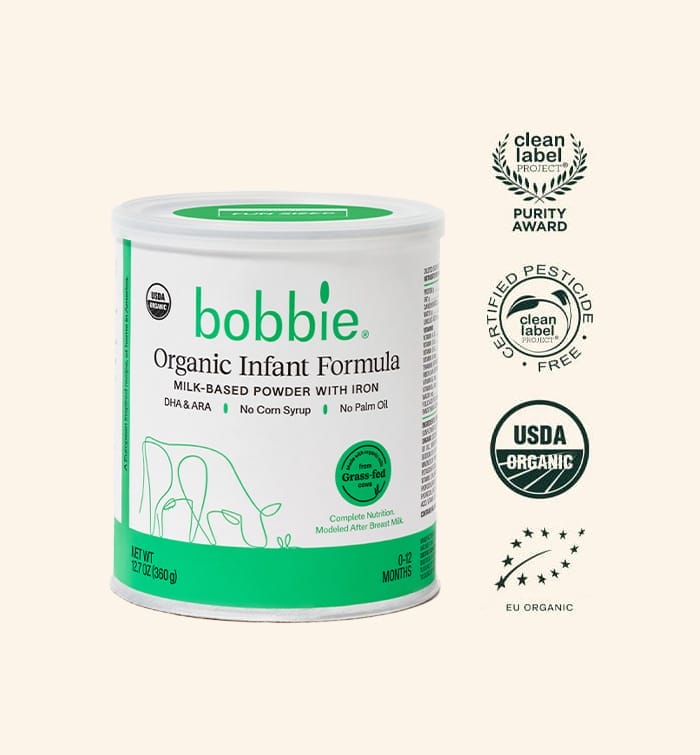We are proud to say that these posts are not sponsored. Our editorial team of Bobbie moms and writers personally select each featured product. If you buy something through our links, we may earn an affiliate commission, at no cost to you.
Combination feeding, or supplementing with formula, is how many families feed their babies in 2022. The phrase combo-feeding may not be part of your vocabulary yet, but it should be! As a NICU RN, mom of 3, and Certified Breastfeeding Counselor, I have encountered countless parents who want to know how to feed their baby in the way that works best for their families. What has really surprised me is the lack of conversation and education on HOW to use infant formula in combination with breastfeeding. For this reason, I created my platform Bumble Baby to help families on their feeding journeys and teach them about how different it can look (even between babies in the same family!).
My 3 children’s feeding journeys looked drastically different. My first son was in the NICU for the first week of his life and had a significant tongue tie. He received pumped milk and baby formula for the first 5 weeks of his life and we were able to breastfeed directly after his revision. I weaned at 11 months because I was pregnant with my second, who I exclusively breastfed for 16 months. My third baby had significant reflux— she was not gaining weight and was spitting up entire feeds. I stopped breastfeeding and switched to 90% baby formula and offered frozen breast milk to her as much as I was able to.



All three kids are HAPPY and HEALTHY. We are bonded in the same ways.
It is reported that about 80% of families supplement with infant formula at some point in the first year of their baby’s life. Combination feeding is something every family should know about. It is OKAY and NORMAL to supplement with formula!
What is Combination (Combo) Feeding?
Combination feeding is an umbrella term for feeding your baby in different ways and through different mechanisms including any variation of:
- Breastfeeding
- Pumping
- Formula feeding
- Mixed formula and breastmilk in a bottle
- Using a supplemental nursing system (SNS)
- Topping off with formula (offering a bottle of formula after nursing)
Reasons for Supplementing with Formula
While lactating is about supply and demand— genetically, everyone’s body produces different amounts of milk. If your body’s genetic make up or lifestyle doesn’t keep up with the amount of milk your baby needs to grow optimally, supplementing with formula is a great and sometimes necessary route! However, even if your body produces enough milk, it is OKAY to use formula in any way you would like. Feeding your baby should work for you and your entire family – and should be a time to bond with your baby. And you can absolutely do this bottle feeding/using formula!
Some common reasons for supplementing with formula:
- Low milk supply
- Boost milk supply
- Anatomical differences in baby (tongue or lip tie, cleft lip/palate)
- Anatomical difference on the breast (flat or inverted nipples)
- Returning to work
- Wanting a partner to be involved in feedings
- Needing a break from feeding
- Mom’s mental health
- Medication that is passed in breast milk
- Wanting to add in formula to extend breast milk/breastfeeding
- No reason at all is needed!

Shop Bobbie Organic Infant Formula
Bobbie Organic Infant Formula is a USDA Organic, EU-style infant formula that meets all FDA requirements. It is a complete nutrition milk-based powder modeled after breast milk and is easy on tummies. It is non-GMO and doesn't have corn syrup, palm oil, or maltodextrin. Learn more about Bobbie.
How to Start Supplementing with Formula
This can vary between families. For example, some families may want to do formula at nighttime and breastfeed during the day. Some families may pump milk during the day and breastfeed at night. Some families may use all breastmilk and one bottle of formula or a mix of formula and expressed milk. All are considered combination feeding. Other examples include:
- Offering one bottle of formula in the middle of the night so a lactating partner can sleep
- Weaning some breastfeeds and using formula instead
- History of low milk supply, topping off with formula after a breastfeed
- Exclusively pumping but baby requires more than your output
Every family and baby is so different. What works for one family may not work for another— and even what works for one baby in the same family may not work for another baby in that same family. If you are wanting to start incorporating formula into your baby’s feeding routine, reach out to your healthcare provider or an expert on our team to come up with a unique feeding plan that meets your goals.
Combination Feeding Schedule
It’s hard to map out a specific combination feeding schedule that will work for EVERY family. What’s important here is that you and your partner find a way to combination feed that works for the entire family unit— and this can look different among families but also with time. In the beginning, feeding can be a seemingly non-stop process with around the clock feedings. A great way to combination feed during the newborn phase would be:
- Pump for one feed and have your partner feed overnight so you can get a longer stretch of sleep
- Offer every other feeding as a bottle of formula, the others at the breast
- Have your partner do the bedtime feeding while you spend time with your toddler/other kids
- Have your partner do the “top off” feeds while you pump (or not pump!)
Supplementing with Formula at Night
Supplementing at formula at night is a great solution for many families. This enables your partner to do the bedtime feeding while you can spend time with your other kids or get a few solid hours of sleep. If you’re wondering can you mix formula and breast milk, the answer is yes. Or the night feed can be a full bottle of formula.
How to Keep Breastfeeding when Returning to Work
Working parents may have to combination feed by default. You can still keep breastfeeding in the picture when you go back to work, if you wish! A great way to do this is:
- Breastfeed the first and last feedings of the day
- Breastfeed overnight only
- Pump at work and breastfeed at home
- Only breastfeed at home and offer formula while you are at work/baby is at daycare
- Offer formula only at night so you can get more sleep
I highly suggest working with a lactation consultant or other feeding professional to map out a specific plan for your family and lifestyle. This is extremely helpful for reaching your feeding goals!
Conclusion About Supplementing with Formula
SO MANY families combination feed and supplement with formula. It’s a GREAT option! Not only does it allow you and your family flexibility, but can take some of the stress and pressure off of feeding. Working with a professional to get a plan together for feeding your baby is highly recommended so you can reach your feeding goals— keeping your supply, weaning, starting to supplement with formula— whatever the case may be. It’s important to remember that LOVE is what’s best for your baby, no matter what’s in the bottle.

Shop Bobbie Organic Infant Formula
Bobbie Organic Infant Formula is a USDA Organic, EU-style infant formula that meets all FDA requirements. It is a complete nutrition milk-based powder modeled after breast milk and is easy on tummies. It is non-GMO and doesn't have corn syrup, palm oil, or maltodextrin. Learn more about Bobbie.

